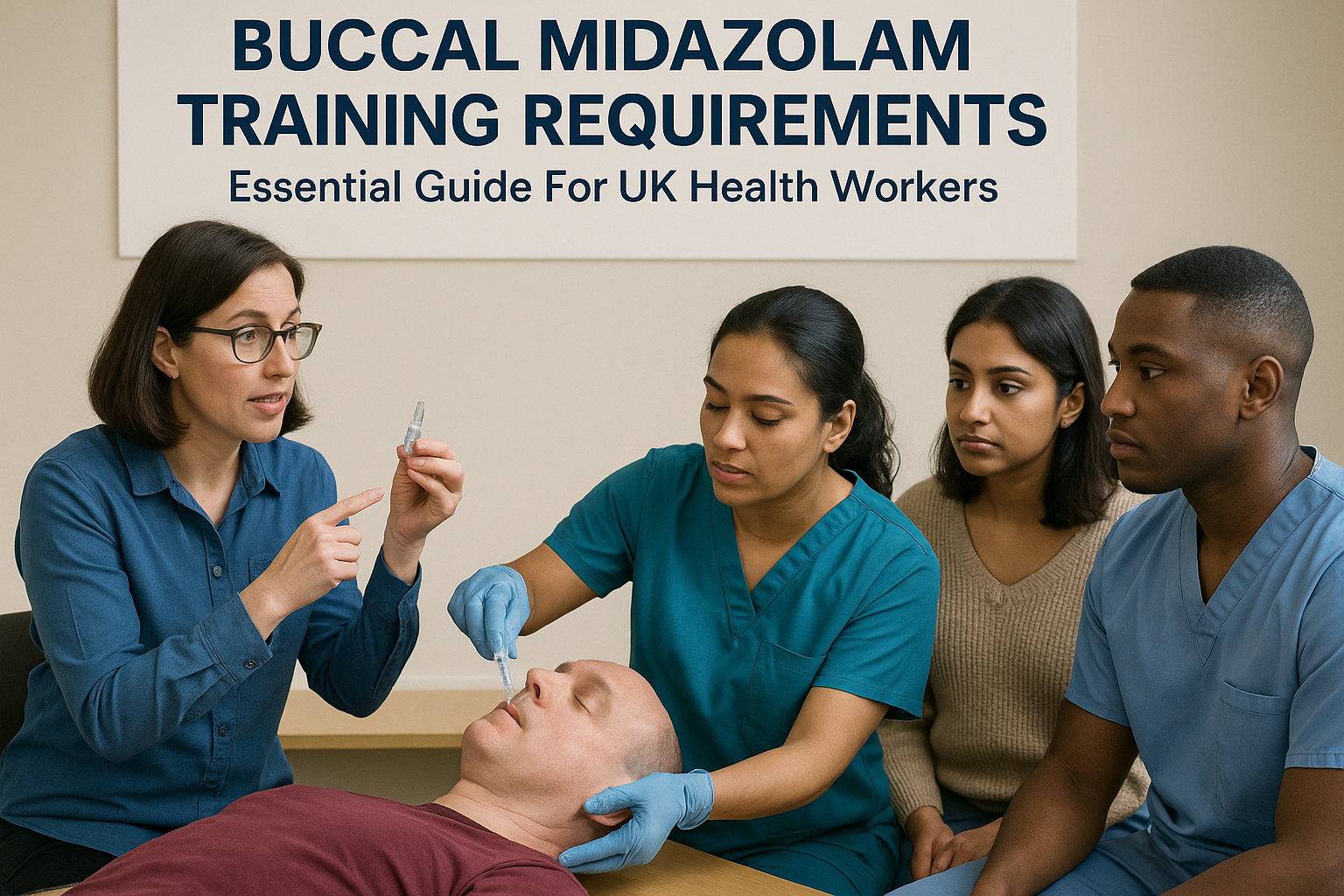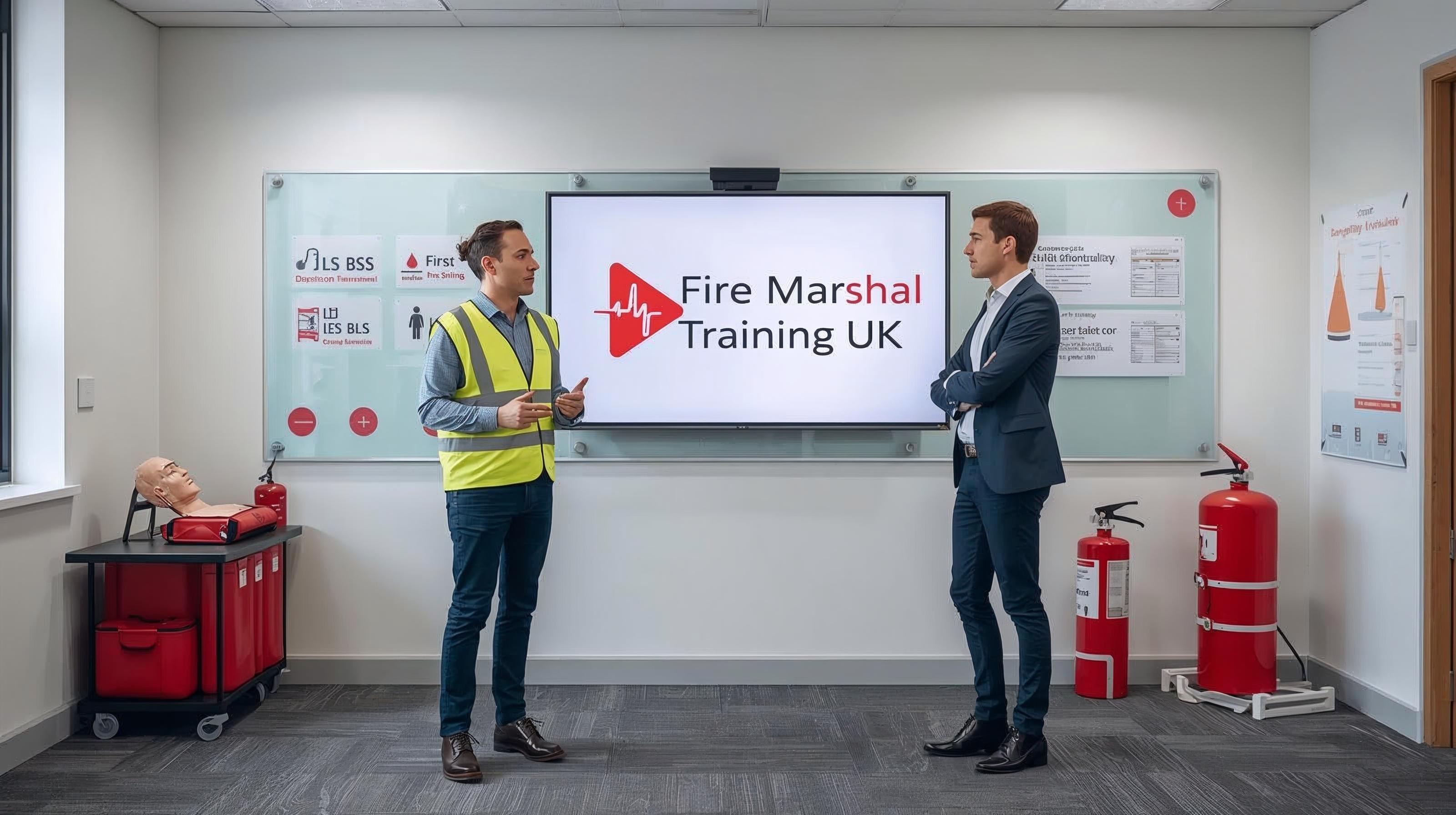Buccal Midazolam Training Requirements: Essential Guide For UK Health Workers


Buccal Midazolam Training Requirements: Essential Guide For UK Health Workers
When a seizure continues past five minutes, every second counts—and the person administering buccal midazolam carries significant legal responsibility alongside the potential to prevent a medical emergency from escalating. UK law permits trained non-clinical staff to give this prescription medication, but only after they've completed accredited training and demonstrated competency.
This guide covers the legal requirements, core competencies, administration procedures, and practical considerations for health and social care workers who give or supervise buccal midazolam in schools, care homes, and supported living settings.
Understanding buccal midazolam and how it works
Buccal midazolam is an emergency seizure medication that goes between the cheek and gum during prolonged or repeated seizures. The medication absorbs through the oral mucosa—the thin tissue lining the inside of the mouth—and enters the bloodstream within minutes without requiring an injection.
This delivery method makes buccal midazolam particularly valuable in schools, care homes, and supported living facilities where staff don't have clinical backgrounds. The medication comes in prefilled oral syringes (commonly branded as Buccolam) that contain precise, weight-based doses.
Indications for use during seizures
Buccal midazolam gets used when a tonic-clonic seizure lasts longer than five minutes, when someone experiences cluster seizures (multiple seizures in quick succession), or when an individual's personalized seizure plan specifies it. The medication enhances the effect of GABA, a neurotransmitter that reduces excessive electrical activity in the brain.
Timing matters—early administration can prevent a seizure from progressing to status epilepticus, a life-threatening condition where seizures continue for 30 minutes or more. However, many seizures resolve naturally within two to three minutes and don't require medication.
Pharmacology and onset timing
As a benzodiazepine, midazolam binds to GABA receptors in the central nervous system and amplifies the signals that calm overactive neurons. When given buccally, the medication typically begins working within 10 to 15 minutes, though absorption rates vary based on saliva production and whether blood is present in the mouth.
The buccal route offers a key advantage over rectal diazepam—the previous standard for emergency seizure management. It's more socially acceptable, easier to give, and often works faster.
UK regulations and legal responsibilities for administering midazolam
The Human Medicines Regulations 2012 allows trained non-clinical staff to lawfully give prescription-only medicines like buccal midazolam in specific circumstances. Staff administering the medication follow either a Patient Specific Direction or Patient Group Direction.
This framework recognizes that waiting for paramedics during a prolonged seizure could result in serious harm. Yet it also establishes clear accountability—staff who give medication without proper training or documentation may face legal consequences.
Human Medicines Regulations overview
The Human Medicines Regulations 2012 created a legal pathway for non-prescribers to supply or administer certain prescription medicines in emergencies. For buccal midazolam, teaching assistants, care workers, and support staff can give the medication if they're acting under a written protocol and have demonstrated competency through accredited training.
Administration occurs under a Patient Specific Direction (PSD)—an individual prescription written by a doctor for a named patient—or under a Patient Group Direction (PGD), which allows administration to a defined group of patients who meet specific criteria.
CQC and Ofsted expectations
The Care Quality Commission (CQC) and Ofsted both examine how organizations manage emergency medication administration during inspections. CQC inspectors look for evidence that care providers have systems for training staff, maintaining competency records, and reviewing incidents where medication was given.
Ofsted expects to see individual healthcare plans for pupils with medical conditions, evidence of staff training, and clear protocols for when and how to administer emergency medications. Both regulators can issue enforcement notices or downgrade ratings if they find gaps in training documentation.
Patient Specific Direction versus Patient Group Direction
A Patient Specific Direction is a written instruction from a prescriber (usually a GP or consultant) authorizing named individuals to give a specific medication to a specific patient. Most care settings and schools use this simpler option.
A Patient Group Direction is a more complex framework that allows healthcare professionals to supply or administer specified medicines to groups of patients who fit defined criteria, without individual prescriptions. PGDs require significant governance oversight, regular review by multidisciplinary teams, and authorization by senior medical and pharmaceutical staff.
Why buccal midazolam training is mandatory for health workers
Training directly impacts patient outcomes and carries legal weight. Without proper training, staff may hesitate during critical moments, give incorrect doses, or miss contraindications that could lead to serious adverse events.
The duty of care that health and social care workers owe extends to being competent in emergency procedures. Courts have held that organizations and individual staff members can be liable for harm resulting from inadequate training.
Clinical risks of untrained administration
Giving buccal midazolam without proper training carries several significant risks:
- Respiratory depression: Midazolam can slow breathing, particularly if the dose is too high or if the person takes other sedating medications
- Aspiration: Incorrect positioning can cause the person to inhale saliva, blood, or vomit into their lungs
- Drug interactions: Midazolam interacts with antibiotics, antifungals, and other central nervous system depressants
- Delayed emergency response: Staff may not recognize when a seizure requires ambulance assistance in addition to medication
Staff who lack confidence may delay administration while they second-guess themselves, losing minutes when early intervention could prevent escalation.
Legal and ethical implications
Administering prescription medication without appropriate training could constitute assault or battery, even with good intentions. More commonly, inadequate training leads to claims of negligence against individual staff members or their employers.
Professional accountability standards from the Nursing and Midwifery Council (NMC) and Health and Care Professions Council (HCPC) state that practitioners can only perform tasks for which they've been trained and assessed as competent.
Benefits for patient outcomes
Proper training improves outcomes for people with epilepsy. Early administration of buccal midazolam reduces the likelihood of seizures progressing to status epilepticus, decreases hospital admissions, and minimizes seizure-related injuries.
People with epilepsy report feeling safer participating in community activities when trained staff are available to respond effectively. For parents of children with epilepsy, knowing that school staff are properly trained provides peace of mind.
Core competencies covered in accredited buccal midazolam training
Accredited courses run for three to four hours and combine classroom teaching with hands-on practice using training mannequins. The most effective programs are delivered by instructors with frontline clinical experience—paramedics, emergency department nurses, or epilepsy specialist nurses who've given the medication in real emergencies.
Recognizing prolonged or cluster seizures
Learning to differentiate between seizures that require intervention and those that will resolve naturally is fundamental. Training covers different seizure types—tonic-clonic, focal, absence—and teaches staff to recognize patterns that indicate buccal midazolam is needed.
Not all seizures look like dramatic convulsions. Some involve subtle symptoms like repetitive movements, altered awareness, or temporary confusion.
Dosage calculation and preparation
Prefilled Buccolam syringes have simplified dosing, but staff still learn weight-based calculations and how to verify they're using the correct strength. Training covers how to read syringe markings, check expiry dates, and identify signs that medication may have degraded.
For settings using multidose vials, training includes drawing up the correct volume using a standard oral syringe and avoiding common measurement errors.
Safe positioning and airway management
Training teaches staff to place the person on their side in the recovery position before attempting to give medication. This reduces aspiration risk and ensures the medication doesn't simply run out of the mouth.
Staff also learn basic airway assessment—how to check that the person is breathing adequately, recognize signs of obstruction, and know when to call 999. Buccal midazolam administration doesn't replace the need for emergency medical services in serious situations.
Post-administration monitoring and escalation
After giving buccal midazolam, staff monitor the person continuously for at least 30 minutes, watching for seizure cessation, adverse effects like excessive drowsiness or breathing difficulties, and signs that a second seizure may be starting. Training covers what observations to make, how to record them accurately, and when to escalate to emergency services.
Documentation requirements get covered in detail—what information to record, how quickly records need completion, and who needs notification after medication administration.
5 steps to safe buccal midazolam administration
Following a systematic approach reduces errors during the stress of an emergency. The five steps below represent the standard procedure taught in accredited training courses across the UK.
1. Check prescription and expiry
Before administering, verify that you have the correct person, the correct medication, the correct dose, and that the medication hasn't expired. Check the individual's care plan to confirm that buccal midazolam is prescribed for them and note any specific instructions or contraindications.
This step includes checking that the person hasn't already received a dose recently—giving a second dose too soon can lead to excessive sedation.
2. Position the patient safely
Move any objects that could cause injury, then gently turn the person onto their side in the recovery position if possible. If the jaw is clenched, wait for a moment when it relaxes slightly rather than forcing it open.
Clear the area around the person's mouth of any food, blood, or vomit that could interfere with medication absorption.
3. Prepare the Buccolam syringe
Remove the cap from the prefilled syringe, hold it upright, and check for air bubbles. Confirm that the syringe contains the dose specified in the person's care plan.
If you're drawing up medication from a vial, double-check your calculation and have another staff member verify the dose if possible.
4. Administer into the buccal cavity
Gently insert the syringe tip between the person's cheek and gum, aiming toward the back of the mouth where absorption is most effective. Slowly depress the plunger over 30 to 60 seconds, allowing the medication to pool in the buccal space.
If the jaw is clenched, you can give the medication in the gap between the cheek and teeth, though absorption may be slightly slower.
5. Monitor and record outcomes
Stay with the person, continuing to observe their breathing, color, and level of consciousness. Note the time the seizure stops and watch for signs of a second seizure starting.
If the seizure continues for more than 10 minutes after administration, or if breathing becomes concerning, call 999 immediately. Complete documentation as soon as safely possible, recording the time of administration, dose given, seizure duration, response to medication, and any observations.
How often should you refresh buccal midazolam training
Competency naturally degrades over time, especially for skills that aren't used frequently. Staff who haven't given buccal midazolam in real situations benefit from regular refresher training to maintain confidence and accuracy.
National guideline recommendations
Most professional bodies and training providers recommend refresher training every 12 months. Some organizations with higher-risk populations opt for six-monthly refreshers, while others extend to 24 months for experienced staff who regularly work with individuals requiring buccal midazolam.
Annual refreshers typically run for two to three hours and focus on hands-on practice and scenario-based learning rather than repeating foundational theory.
Signs your team needs a refresher
Several indicators suggest that refresher training has become overdue:
- Low confidence levels: Staff expressing uncertainty about procedures or requesting supervision for tasks they previously performed independently
- Documentation errors: Incomplete records, missing information, or inconsistent recording practices across the team
- Technique variations: Different staff members using different methods, suggesting that the standardized procedure has drifted
Staff turnover also creates training needs—new team members require full training, and existing staff may benefit from refreshers when new colleagues join.
Choosing an on-site buccal midazolam training provider in the UK
The training provider you select impacts the quality of skills your team develops and the safety of the people you support. Cost matters, but it's not the only factor to consider.
Accreditation and trainer credentials
Look for courses accredited by recognized bodies like the CPD Certification Service, Royal Society for Public Health, or Epilepsy Action. Accreditation provides assurance that course content meets national standards.
Trainer credentials and experience matter equally. The most effective training comes from instructors who've actually given buccal midazolam in emergency situations—paramedics, emergency department nurses, or epilepsy specialist nurses who can share real-world insights.
Group pricing and scheduling flexibility
On-site group training typically offers better value than sending staff individually to public courses. Many providers, including Kasorb, offer flat-rate pricing for groups of up to 12 people, making it cost-effective to train entire teams simultaneously.
Providers who can deliver training at your location, at times that suit your operational needs, minimize disruption and ensure maximum attendance.
Evidence of hands-on scenario practice
Reading about buccal midazolam administration differs significantly from actually doing it under pressure. Quality training programs dedicate substantial time to hands-on practice with mannequins, allowing staff to physically rehearse the steps multiple times.
Scenario-based learning—where trainers present realistic situations and staff perform skills in context—builds the kind of muscle memory that translates to real emergencies.
Creating individual seizure care plans and record keeping
Clear, personalized protocols tell staff exactly when and how to give buccal midazolam for each individual. Seizure care plans bridge the gap between general training and specific application.
Essential care plan elements
A comprehensive seizure care plan includes the person's seizure types and typical patterns, specific triggers to avoid, detailed instructions on when to give buccal midazolam (including timing and circumstances), the exact dose prescribed, step-by-step administration instructions, emergency contact numbers, and when to call 999.
The plan also notes any contraindications or special considerations—for example, if the person has a history of respiratory problems or takes medications that interact with midazolam.
Digital certificate storage for audits
Maintaining accessible, organized records of staff training is both a regulatory requirement and a practical necessity. Digital storage systems allow you to quickly demonstrate compliance during CQC or Ofsted inspections, track when refresher training is due, and identify gaps in team coverage.
At Kasorb, we provide comprehensive certification documentation that includes the course content covered, assessment results, and renewal dates.
Common mistakes and how to avoid them during administration
Even well-trained staff can make errors during high-pressure situations. The most common mistakes typically occur in three areas.
Incorrect dosage
Dosage errors usually happen when staff confuse different strengths of Buccolam or when patients' weight has changed significantly since the care plan was written. Using prefilled syringes whenever possible and implementing a double-check system where a second staff member verifies the dose before administration helps prevent errors.
Regular reviews of care plans—at least annually or whenever the person's weight changes by more than 10%—ensure that prescribed doses remain appropriate.
Delayed administration
Hesitation is understandable—staff worry about making mistakes or feel uncertain whether the situation truly requires medication. However, delays can allow seizures to progress to more dangerous stages.
Training that emphasizes decision-making frameworks and provides clear criteria for when to give medication helps staff act confidently and promptly.
Poor documentation
In the stress following an emergency, documentation often gets delayed or completed from memory hours later, leading to inaccurate or incomplete records. Having simple, standardized documentation templates readily available—ideally pre-printed or on mobile devices—makes it easier for staff to record essential information immediately.
Templates prompt for all critical data points: time of seizure onset, time of medication administration, dose given, response observed, and any follow-up actions taken.
Next steps to book group buccal midazolam training with Kasorb
Kasorb delivers accredited buccal midazolam and epilepsy awareness training directly at your workplace, with flexible scheduling that works around your operations. Our training is led by experienced NHS clinicians—paramedics and emergency department nurses who've given buccal midazolam in real emergencies.
We deliver hands-on, scenario-based training that builds genuine competence and confidence. With our flat group rate covering up to 12 staff members, you can train your entire team cost-effectively in a single session.
Book your on-site buccal midazolam training session or contact us to discuss your specific training needs.
FAQs about buccal midazolam training in the UK
What age restrictions apply when administering buccal midazolam in community settings?
Buccal midazolam can be given to patients of all ages when properly prescribed and staff are appropriately trained. Dosage calculations vary significantly by age and weight, with pediatric doses requiring particular precision—training programs emphasize the importance of following the specific prescription in each individual's care plan.
Can non-clinical school staff be trained to give buccal midazolam?
Yes, teaching assistants, learning support staff, and other non-clinical school employees can receive training to give buccal midazolam to pupils with epilepsy. Schools have a legal duty under the Children and Families Act 2014 to support pupils with medical conditions, and properly trained staff administering emergency medication under a Patient Specific Direction fulfills this duty.
How long should you wait before giving a second dose of buccal midazolam?
A second dose can only be considered after 10 minutes if the seizure continues, and only if specifically authorized in the patient's individualized care plan. Emergency services (999) get called if a second dose is required, as ongoing seizure activity after buccal midazolam administration indicates a more serious situation requiring advanced medical intervention.


Book a free 15-min consult call with us. We’ll help you get your mandatory training done right.





